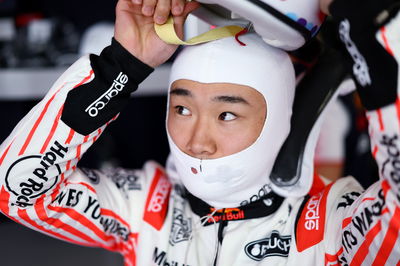James Allison, Lotus - Q&A

Q:
Melbourne and Sepang have some similar characteristics; how does Shanghai differ?
James Allison:
China presents quite a different challenge to the last two circuits. Melbourne has a lot of medium speed corners with relatively few at either end of the scale, while Sepang has a reasonable spread; perhaps slightly biased towards the more high speed corners than average. Shanghai by contrast has almost no high speed corners, featuring predominantly low speed ones with a smattering of medium. Some of the lower speed corners are also extended in their radius, even with tightening arcs. This provides quite a stern test for the tyres, as you have a significant excess of torque over grip making it very easy to wreck a set of rear tyres rather quickly. It's generally quite cool in Shanghai as well - unseasonably so last year - meaning that graining will be an issue once again; particularly given the smoothness of the asphalt which is comparable to that of Melbourne. From what we've learned so far the E21 is reasonable in conditions where graining is rife, so we're hoping for more of the same in China.
Q:
2012 saw Kimi's race unravel late on; what was this down to?
James Allison:
Last year we ran a strategy which saw our drivers make one stop fewer than the rest of the field. In the end this proved a bridge too far for Kimi, largely down to the fact that he tends to be fractionally harder on his front tyres than Romain. As it turned out this race was a bit of a graining fest for the fronts, which was unfortunate as prior to that point he was sitting quite pretty in that race.
Q:
A few teams have suggested that this year's tyres are too big a step from those of 2012; would you agree?
James Allison:
Not really; they're just one step softer all round than last year and the new construction makes it harder to access the rubber on the inner corner of the tyre. In other words, the available rubber is reduced as it's very tricky to get the entire width of the tyre in contact with the road. Certain teams are keen for a switch back to last year's rubber, but teams will always push for what's in their best interest. We feel the current tyres makes for entertaining racing, but then we would say that as our car tends to prosper when the tyres are tender.
Q:
The inclement conditions in Malaysia weren't in our favour; where do we stand on that?
James Allison:
The result in Sepang was obviously not what we were looking for, but that can largely be attributed to being half a minute down after seven laps. I have to be completely candid and say that wet weather is not our forte. We struggle to get the intermediate tyres warm enough to grip the road, and our current rear wing configuration for - whilst aerodynamically stable in wet conditions - does not generate the sort of downforce levels required for a wet track. Unfortunately we will be fighting an uphill battle with this until we bring a new, higher downforce rear wing to the track.
Q:
Romain showed marked improvement over the weekend in Malaysia; is he now happier with the car?
James Allison:
Romain started off the weekend with a setup that was far too oversteer biased, but through gradually moving towards greater levels of understeer he became significantly more comfortable in the car; subsequently putting in a very good race performance. As mentioned previously, these tyres really do reward a well-balanced car, but the format of a race weekend places sufficient time constraints to make finding that sweet spot a challenge. In Melbourne we didn't quite manage to find the zone with Romain, but by the end of the week in Malaysia we had it much more to his liking and he subsequently rewarded us with a sterling drive.
Q:
Do we have any upgrades planned for China?
James Allison:
We'll be upgrading Romain to the latest spec exhaust and related bodywork as run by Kimi in Malaysia. We also have a few small tweaks to the front wing, rear wind endplates and sidepod vanes. One of the benefits gained from the new exhaust package is an increase in rear downforce through corners where the ratio of exhaust speed to car speed is high, which tend to be the lower speed corners. This is a good step forward which we hope will aid us in protecting the tyres at this kind of circuit.











